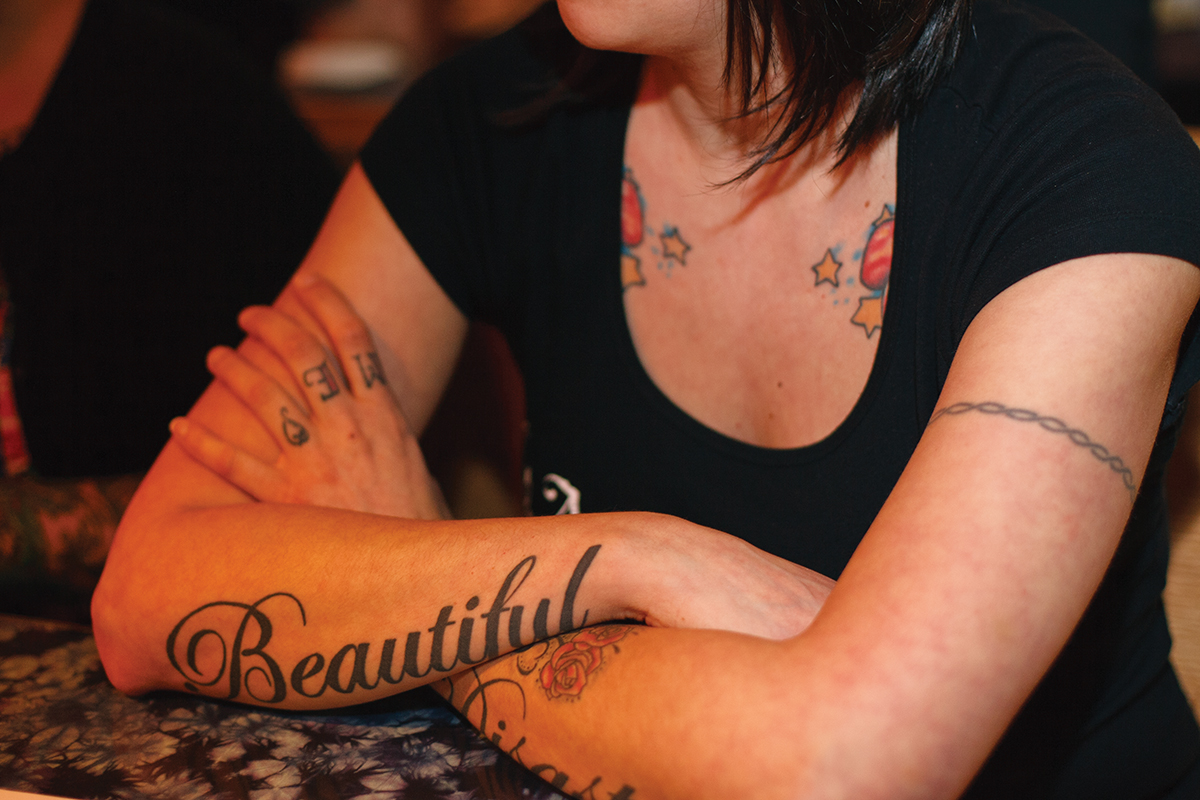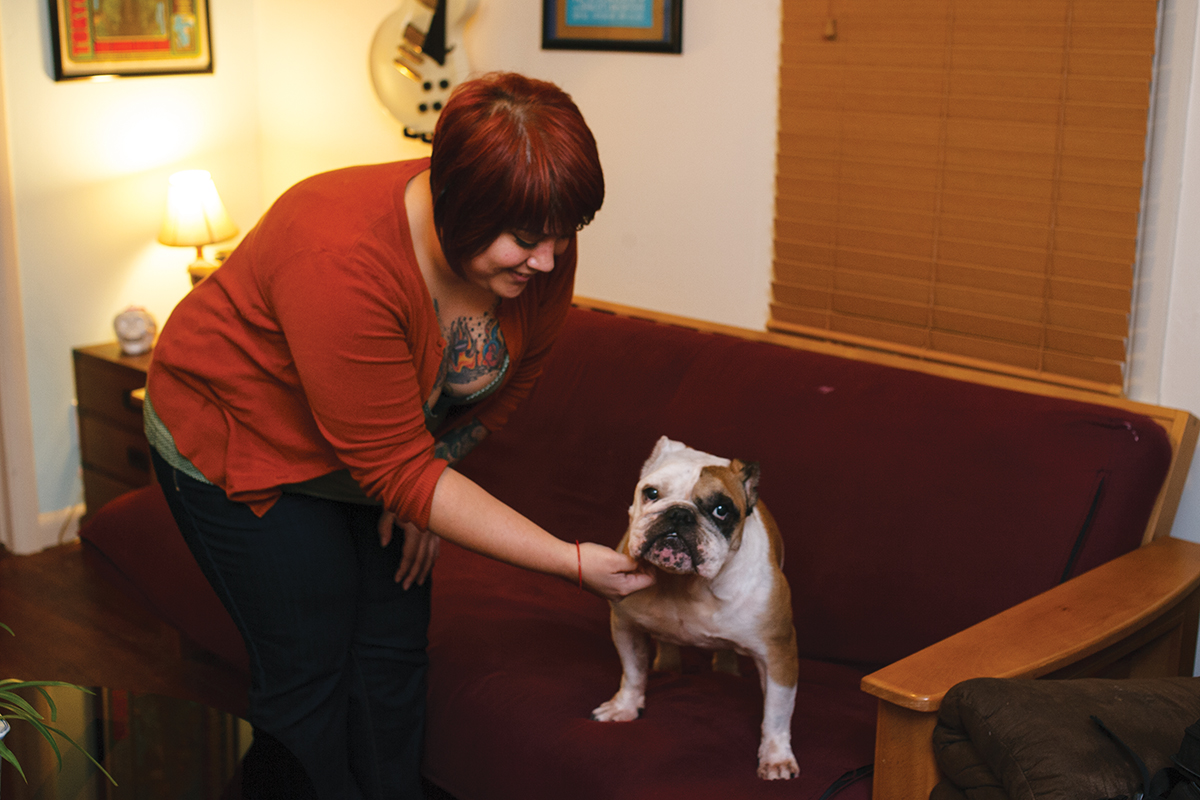Story by Alexandra Hicks
Photos by Matt Williams
It’s hard to hear above the blaring sound of the punk-rock band warming up tonight. My booth at Cozmic Pizza is in one of the darkest spots in the already dimly lit restaurant. Impatiently, I scan the room looking for my interview subjects. Finally, Tawnee Suchey and Shirley Esterline burst through the door. Both women are covered in tattoos. Suchey has a total of 17 spanning her chest, arms, neck, and legs. Esterline has only 11, but her body features 28 hours of needle work on her arms, chest, and the massive peacock on her back. Apologizing profusely for their tardiness, the women sit down across from me. They had just come from getting pierced, Suchey explains, showing me the new magenta stud in her lip. Esterline says she chickened out. In fact, Esterline confides, she has had to attempt each of her facial piercings multiple times—she is afraid of needles.
Suchey and Esterline had gone to the piercing parlor with five other members of the Oregon Chapter of the Modified Dolls, a global organization aimed at breaking stereotypes associated with tattooed and pierced women. This night, the chapter was hosting its first major event, a concert at Cozmic Pizza in Eugene, Oregon, to raise money for the Special Olympics. Much like other philanthropic groups, the Dolls hold monthly meetings, fundraise, and host charity events. There’s just one catch: Each member has at least five visible body modifications.
Suchey, whose body art ranges from a butterfly tattoo to a Mexican flag honoring her heritage, says it’s no secret that tattooed women have a certain image in the public mind. Rebel, wild, dangerous, and irresponsible, are just a few examples she offers when describing prejudices modified women are often tagged with. Although she had often received insults like these herself, it was only after seeing the Modified Dolls’ Facebook page a little over a year ago that she decided to become proactive about her body art. Initially, Suchey donated to a national Dolls charity fundraiser. Then after attending several local events, she felt inspired by seeing women who looked like her helping neighboring communities, and she officially joined the Modified Dolls Oregon Chapter.
Modified Dolls founder Holly Roettger-Duncan is all too familiar with negative stereotypes being attached to her appearance. As a modified woman, she was looking for a way to get involved in her community while demolishing negative labels typically directed at women with body art. She had been a member of several modified women groups where she lived in Kennewick, Washington, but disliked their appearance-driven nature. “They were all about ‘Look at me’ instead of ‘Look at who I am on the inside,’” Roettger-Duncan says. “So I decided starting my own group was the way to go.”
In August 2011, she and ten modified friends got together with the intention of creating a small group dedicated to helping their community. Those first ten members quickly grew into 200 over the next two years, and now Modified Doll chapters are located in 48 states and eight countries around the globe. In 2012, the group was officially granted non-profit status. The Dolls have a highly organized structure in which each state has a chapter, and each chapter is often divided into subchapters because members are not expected to drive more than an hour for meetings. Meetings are held monthly to plan the group’s upcoming charity events. Each month a different charity is chosen by the national organization headquartered in Kennewick, but chapters can partner with local charities as well. The Modified Dolls have supported numerous organizations such as the Special Olympics; Women’s Space; and the Race, Abuse, and Incest National Network.
Members are referred to as “Dolls,” and each Doll has a “doll name.” Suchey, the Oregon Chapter’s second-in-command and longest-standing member, chose Tawnee Amber. Esterline goes by Sorelle. “It’s a variation of Esterline, I can’t remember from where,” she says. “But I like that it sounds like ‘so real.’”
Esterline is the Oregon Chapter’s Head Doll, meaning she acts as president of the chapter. Her responsibilities include contacting organizations, maintaining a strong social media presence, working on public relations, and most importantly, selecting new members to become Modified Dolls.
The group’s application process is rather extensive. On the first and the fifteenth of each month, the national office sends out applications from prospective Dolls to each state’s Head Doll. The Head Doll then carefully reviews each application. The only requirements are that the women must be over 18 years old and have at least five visible body modifications, which can include tattoos, piercings, gauges, or subdermal body implants. To be considered for initiation into the group, applicants must send photographic evidence of their body modifications. But even after the applications are reviewed, the process isn’t quite complete.
To ensure commitment to the Modified Dolls’ mission, organizers ask that applicants complete challenges like photographing themselves passing out fliers to raise awareness about the group and its events. “We want to make sure they are actually committed to the organization, so we have little challenges like these,” Suchey says. “A lot of people join thinking it sounds cool without realizing it will actually take work.”
The Oregon Chapter often receives applicants who want to use the organization as a means of exposure or to promote a modeling career. But the Modified Dolls are not about looks in any way. This is a stark contrast to other modified women’s groups that have gained mainstream publicity in the past few years, such as the Suicide Girls based in Portland, Oregon. The Suicide Girls is an “adult lifestyle brand” that features videos and posters of modified pin-up style models on its website. Suchey explains that the
Suicide Girls once featured heavily modified women of all shapes, but the group has now moved to a standardized “model” look featuring women who sometimes have only one small tattoo. In contrast, the Modified Dolls look for women of all shapes and sizes who want to do more than just show off their bodies. “We stalk applicants’ Facebook pages,” Esterline says bluntly. “We want to make sure they’re not projecting the stereotype that we’re trying to demolish.”
Despite the popularity of tattoos and body modifications—more than 14 percent of Americans are now tattooed—Esterline says increased exposure doesn’t always equate to acceptance. Women who choose to get body art are still subject to unjustified and sometimes hurtful treatment.
As a mother of three kids ages seven, 11, and 14, Esterline often feels judged for being a parent with modifications. “I’m a great mom,” she says. “I’ve been a Girl Scout troop leader and a Boy Scout pack leader, but you would never know that just by looking at me!”
And although she has not had a problem finding work as a result of her body art, Esterline says she still experiences discomfort because of her appearance. As an employee at Fred Meyer, Esterline says she receives frequent stares and comments from customers, including one man who remarked that her tattoos looked “festive.” When she asked what he was referring to, he pointed directly at the two cherries located on either side of her chest. Esterline says she was offended because she felt she was being discriminated against as a modified person, in addition to being singled out as a woman with tattoos. “There’s definitely a double standard for women,” Esterline says. “[Maroon 5 frontman] Adam Levine can be on the cover of a magazine and have all of his tattoos showing, but [actress] Megan Fox can be on the same cover and has to cover them up.”
Suchey has experienced similar scrutiny. Before moving to Eugene in January, she lived in a much smaller Oregon city. There, she says it was impossible to escape the constant stares of passersby and judgments based solely on her appearance. Because she had body art, Suchey felt she was instantly labeled a troublemaker in the small-town culture she believes held unfounded, preconceived notions about people with tattoos.
Even within their own community of tattooed women, the Dolls say they face prejudice. Esterline describes another experience she had with a customer recently: “An older woman was giving me a lecture on my tattoos, especially the ones on my chest and my arms for being ‘too visible,’” she
says. “But then she mentions that she got a tattoo for her fiftieth birthday. She lifts up her pant leg, and she has a tiny ladybug tattoo on the side of her calf.” Attitudes like this, Esterline says, reconfirm the double standard she feels modified women face even among other tattooed women—that women can have tattoos, but only if they are considered “feminine.”
But despite the stereotypes some women have toward each other, being a member of the Modified Dolls gives Esterline and her fellow Dolls a sense of empowerment in the face of discrimination. “I don’t have [tattoos] so people will look at me,” Suchey says. “I enjoy looking at myself and seeing tattoos. When I go places with my mom, she’s always the one who says, ‘That lady is looking at you!’ but it doesn’t bother me. If anything, I hope that they’re enjoying them as much as I do.”
This is the self-confidence the Modified Dolls want to inspire.
“The girls we have are of all shapes and sizes,” Suchey says. “I think girls have really messed up body images; that’s why we have all different types of women. We have older women, younger women, big women, skinny women—it doesn’t matter. And once they join, they feel that camaraderie.”
Suchey says the camaraderie is what she has grown to cherish most about the Modified Dolls. When she joined the organization a little over a year ago, Suchey was one of just five members of the Oregon Chapter. Since then, she has watched the chapter grow to 13 dedicated women—all of whom she feels fortunate to call close friends. “I didn’t really have a lot of girlfriends before this, but now I feel like I’ve met a strong group of girls who have my back,” she says. “There is definitely a feeling of sisterhood.”
Inspired by the support and self-assurance generated within the Modified Dolls, Suchey plans to continue breaking down ignorance surrounding women with body art. “It gives you confidence to be a part of something, especially something positive,” Suchey says. “So maybe when somebody sees a crazy tattooed woman from across the street, their first instinct isn’t ‘party animal,’ or ‘floozy,’ or ‘freeloader.’ They’re good people; they want to do good. They’re just regular women who happen to be modified.”









